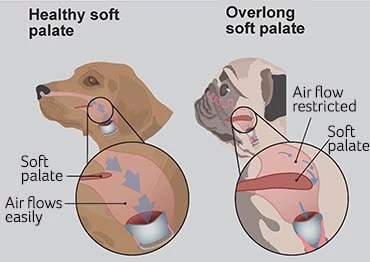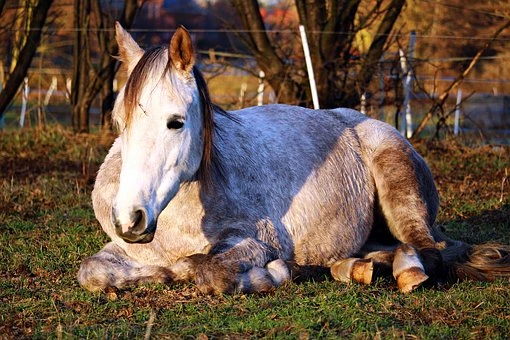- Brachycephalic means ‘short head’ (flat-faced).
- Flat-faced breeds are popular because of their loveable nature, but sadly, they often have trouble breathing because of how they look.
- Flat-faced breeds have a normal amount of tissue packed into a much shorter nose. This means that they often suffer with narrow nostrils, narrow nasal passages, a narrow windpipe and an overlong soft palate. These issues often result in breathing problems (‘BOAS’).
- Visit your vet for advice if you think your dog may be suffering from BOAS.
If your dog develops sudden breathing problems, contact your vet immediately.
BOAS is a combination of the following problems:
1.Narrow nostrils – Having narrow nostrils makes breathing difficult; some severely affected dogs have to pant to get enough air.
2.Crowded nose and throat – Flat-faced dogs have a lot of nose tissue packed into a small space, which means they have to breathe through very narrow, crowded nasal passages.
3.Overlong soft palate – Flat-faced dogs often have a large soft palate that sits further back than normal. It often covers the windpipe, which makes breathing difficult.
The soft palate can also cause problems during sleep – if it’s covering the windpipe you may notice your dog snoring or waking up suddenly gasping for breath.
4.Narrow trachea (windpipe) – This makes breathing difficult, especially when exercising. There are also two laryngeal saccules that are normllay inverted but becomes everted as they turn outwards, into the trachea as they are sucked into the airway by the pressure created by the increased respiratory effort BOAS dogs exhibit.
Symptoms:
- Noisy breathing
- Snoring
- Panting (even when resting)
- Unable to exercise properly
- Struggling to keep up with other dogs
- Needing regular breaks from exercise
- Unable to cope with hot weather
- Sneezing excessively
- Blue gums
- Collapse.

Treatment:
Surgery – Your dog may benefit from surgery to widen their nostrils and shorten their soft palate. If your dog is severely affected, they may also need the sacs from their windpipe removed. There are risks associated with surgery and it’s important to discuss these with your vet. Your vet may refer your dog to a specialist for surgery.
Outlook and ongoing care – The outlook for your dog depends how severely their breathing is affected. Here are a few tips to help them at home:
Hot days – It’s difficult for flat-faced breeds to stay cool on hot days, avoid the midday sun and only walk them when it’s cool.Always take water on walks and if necessary, walk near water so they can cool down easily.
Exercise – Keep your dog as fit as possible and build their fitness gradually and put your dog on a lead if they are struggling to chase another dog as flat faced breeds often struggle to keep up with other breeds. Attach your dog’s lead to a harness not a collar as pressure on their neck will make breathing more difficult.
Diet – Flat-faced breeds are prone to weight gain which will make any breathing problems worse.





